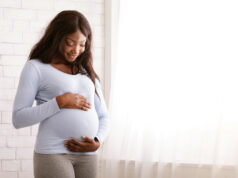The decision to have kids at a later age is becoming a common trend. This could be as a result of a number of factors; factors that may include career, initial lack of interest or readiness for child responsibility, unreliable partner or in some cases, biological factors.
Whatever the case may be, it is still a beautiful decision and I personally adore women who still try to give life another chance through them. If you do decide to have a child after the age of 40, then you must know about some of the advantages and possible disadvantages of being a mother late.
Childbirth is a beautiful thing and the joy that comes with it is indescribable, however, childbearing comes with its price. Let us look into 5 advantages and 5 disadvantages of becoming a mom after 40
Advantages:
1. Longer lifespan:
Women who decide to get a go at giving birth after they hit 40 may have a chance of living even longer. Studies shows that women who stopped having kids before they reach the age of 30 cut their chances of living up to the age of 90 to 95 into half. A valid reason for this could be genetics.
If a woman’s reproductive system at that age is perfectly functional, then it may also be applicable to other processes linked with aging. Furthermore, the connection between longevity and childbearing was mostly correct for women with 3 kids, or less.
2. Minimal cognitive decrease:
Further studies shows the link between a mother’s better post menopausal cognition and the last pregnancy happening at a later age. Conclusions were made based on a series of tests that involved tasks for numerous aspects of brain works.
Particularly, women that continue childbearing after 35 have better verbal memories. This is solely because our brains are affected by hormones. Hormones such as progesterone and estrogen which are extremely vital for brain functions and development of brain tissues.
3. You are more experienced at this age:
It is no news that we acquire knowledge and skills as we grow older. Women know more when they are 40 and above than when they were 20 or even 30. This knowledge and experiences plays a huge role in raising children.
Women over the age of 40 express more patience towards their babies, and relate better with their children with more thoughtfulness.
Normally, women don’t become pregnant just like that during these period. It is mostly a deliberate step towards having a baby and some levels of preparation has to be met.
This means, you are not only stable psychologically, you are also stable emotionally. This also means that you ready for the changes that comes with getting pregnant and post pregnancy.
4. You are stable financially:
Most women are already have a career by the age of 40. They rarely change jobs or are busy trying to figure life out. This means they have already achieved a level of stability than they did in their twenties. They have a stable income and almost every aspect of their lives are in the right place.
Women who decide to have children when they reach the age of 40, do so knowing they are comfortable enough to put a pause on their career and focus on their child. The idea that you don’t have to wake up early in the morning and hurrying off to work gives you all the time to focus on your baby.
5. Ample time to do anything and everything:
When a woman is above 40, she must have had her share of fun. Partying, clubbing, traveling, time-out with her girlfriend and whatever fascinates her. At this point, she can focus on raising her child and dedicate all her time into making that happen.
Women above the age of 40 are less likely to have any social regrets because they must have accumulated tons of fun memories to last them a lifetime. This makes it even more easy to dedicate time to your baby. However, despite the advantages of having a child after 40, there are also certain risks involved.
Disadvantages:
1. Minimal chances of becoming pregnant:
As years goes by, women’s biological clock tick very fast and it reduces their chances of becoming pregnant. Fertility starts to decline sporadically when a women hits the age of 32.
The number of eggs in the womb experience significant decrease, making fertilization difficult. Eggs incorrectly released by the ovaries can occur and the event of unhealthy eggs getting released increases.
Thanks to modern day technology, the option of opting for donor eggs is available. You could also have your eggs frozen earlier or have your child through surrogacy.
2. Higher risk of miscarriage:
The risk of having a miscarriage increases as a woman gets older. The chances of a woman having a miscarriage reaches 50% or even more when she reaches 45 years old and above. Age isn’t the only factor that affects pregnancy loss but changes linked with aging influences the female body, minimizes hormonal and uterine function, as well as other factors.
3. Higher risk of having osteoporosis:
Childbearing at a later age speeds the chance of developing osteoporosis (weakness of the bones). Studies show that people who give birth after they get to the age of 35 are twice as likely to have the disease. It is very important that you pay close attention so your bones during pregnancy. This helps to reduce your chances of having osteoporosis.
4. Higher risk of preterm birth:
Getting pregnant when you are above 40 increases the chances of the baby not being born at the right time. The child may be born earlier than expected and this can cause low birth weight. Further research shows that age itself, not to mention other negative factors, may be the reason why we have premature births.
5. Risk of gestational diabetes:
An insufficient amount of insulin during pregnancy can result to gestational diabetes. However, this is only temporary.
according to studies, the chances of developing gestational diabetes is increased by 75% in pregnant women who are above the age of 40. It is very crucial that you run some tests for gestational diabetes and seek medical advice and treatments, depending on the outcome of the test.
Becoming a mother is a very beautiful thing. Pregnancy may have its downside at any age, but it mostly depends on how healthy the mother is during pregnancy. If you do decide to have a child when you are 40 and above, then it is imperative that you seek medical advice and make sure you have everything covered during this period.
Tell us what you think about this article. Should women wait till they are 40 before giving birth to children? Or should they have their kids when they’re still in their 20s and 30s? Leave your thoughts in the comment section below.












